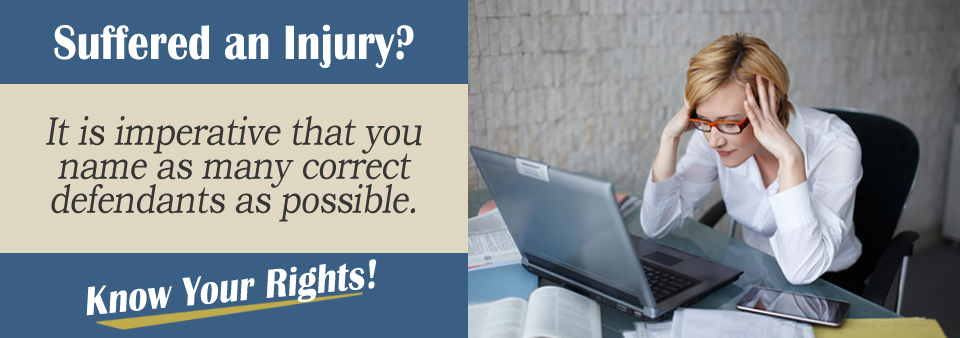If you have been injured in any sort of accident that was not your fault, you will be justified in pursuing legal action against whoever was responsible for your accident. Often, pursuing legal action in a small claims court is easier and faster than using a regular civil court, especially if the amount you are requesting as compensation is not too high. The amount that can be claimed in a small claims court depends on where the case is heard, but typically is less than $5,000.
Why it is so Important to Name the Defendant Exactly
In a personal injury lawsuit, you are the one bringing the claim to court and are called the “plaintiff”. The person, persons, business or organization that you are claiming money from are know as the defendant. If you get the defendant wrong or leave out one of the defendants and the court decides that the person you have named is not to blame, then you will not win the case and you will not get any compensation.
When you name the defendant or defendants, it is important that the exact name of the individual(s), the correct name of the business or the government agency is used, otherwise the court may not be legally bound to request that compensation is paid by them.
Individual or Business?
It is important that you name all those who you think may be responsible for your accident. This is where the help from an experienced personal injury attorney will mean you get this part of the claim right. Take an example of a slip and fall accident where you slipped over on something slippery on a supermarket floor. You think that a particular employee was to blame because they caused the mess on the floor. However, the employee says that he or she was told to make the floor wet by the manager or because it was company policy. If you do not name the manager or the business as well and the court finds that the employee was not to blame, but it was the manager’s fault, then you will lose the case.

Who Was Insured?
If you name a defendant who did not have insurance, then you may not win any compensation, especially if the defendant does not have any assets that can be used to pay your claim. This might happen if you were injured in a vehicle accident by a driver who was driving someone else’s car or a company car or truck. If you just name the driver as the defendant, the driver may not have had insurance to drive the vehicle. If you name the owner of the vehicle as well as the driver, whatever the decision of the court, then it is much more likely that one of the defendants was insured and you stand a greater chance of a successful settlement.
File Your Claim in Time
The state you are filing your lawsuit in will specify how long you have to make a claim. This is known as the state’s statute of limitation. When naming the defendant, the statute of limitation may be much shorter if the defendant is a government body. For example, if you have been injured as a result of an accident on a city bus and you decide to sue the city’s mass transit authority, you may have much less time than if the accident was caused by an individual driver in another vehicle.
When an Attorney Can Help
Making a claim in a small claims court may be relatively easy compared to a regular civil court and you may decide that you have the competency to handle the claim yourself. However, you may also feel that you have a much greater chance of getting the claim heard successfully if you use the services of an experienced personal injury attorney who will have handled claims like yours many times before.